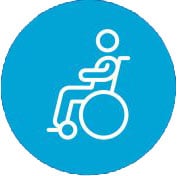
The Wheelchair Charter
The Wheelchair Charter is a set of 6 principles that seek to ensure that everyone who needs a wheelchair gets one, and no one is left without the equipment they need because of where they live.
The Wheelchair Charter applies to:
- NHS provided and commissioned wheelchair services (specialist professionals who provide wheelchairs via NHS referral) and
- Private and independent suppliers of wheelchair services.
There’s also a helpful charter guide for wheelchair users to help you decide with your therapist which wheelchair is right for you, leaving you free to get on and live your life more independently.
The Charter

An NHS commissioned service committed to:
Equity of access and provision for all, irrespective of age or postcode.
A working partnership with wheelchair users and their family/carers, including with design, innovation and service change.

Referrals:
From an appropriately skilled professional.
Undertaking assessment and wheelchair provision within the NHS constitutional right of 18 weeks.

Assessment
Wheelchair and postural support assessment should consider all aspects of an individual’s current and future needs, including those of carers, with a prescription maximising independence, health and wellbeing.
Clinicians will work with appropriate services to achieve goals agreed between the wheelchair user, carers and wheelchair provider. This includes access to home, school, work and leisure activities.

Equipment:
Delivered, maintained and regularly reviewed as per nationally agreed timescales.
Individual reviews based on recognised outcome measures.
The service delivered across geographical boundaries where needed.
Provision of emergency backup contacts.

Funding
Opportunities will be sought to access flexible and innovative budgeting, including Personal Wheelchair Budgets.
Collaboration with different services and alternate funders to facilitate agreed outcomes.

Staffing
The specialist professionals will be appropriately qualified and will receive on-going training and development.
Will have a broad knowledge of wheelchair and postural support options.
Work with manufacturers and independent organisations to develop innovative and affordable products for the future.
The Charter Guide for Wheelchair Users
The Charter is written to influence the provision of NHS commissioned and/or tendered out wheelchair and postural seating services. It should also be considered as a benchmark of best practice for independent, third sector and private providers of similar services.
The Wheelchair Charter gives guidance to wheelchair service professionals on what wheelchair users should expect from their services.
Although the Charter is for professionals and uses health and social care language, it’s important that you can use it too so they can be held to account.
That’s why we created this guide. It’s here to help ensure that you receive the best wheelchair for your assessed needs.
After reading, please download it or print it and take it with you to meetings with your wheelchair service therapist. Use this guide to discuss the various options available to you, bearing in mind:
- the things you need to achieve using your wheelchair, and
- any implications for those who care for you.
Each numbered point below refers directly to the same point in the Wheelchair Charter.
1. The commissioned service
Your wheelchair service will provide your wheelchair based on your assessed need.
Factors like where you live, age, ethnicity, sex, and other protected characteristics will not affect your wheelchair provision.
Your local commissioners must ensure that you, your family and your carers receive a wheelchair service (including design, modernisation and service change).
Your wheelchair service provider should have a wheelchair user group you can join to help shape services now and in the future.
2. Your referral
Your GP or local healthcare professional will send your referral to your wheelchair service.
An appropriately skilled professional, such as an occupational therapist, physiotherapist or rehabilitation engineer, will receive your referral. They will send you an appointment for your assessment, noting if you have urgent needs. These may be things like a rapidly changing condition or other health needs that require addressing quickly.
You should receive your wheelchair within 18 weeks of your referral for an appointment with your wheelchair service professional. Sometimes specific periods (such as extended holidays or hospital admissions) aren’t included within the 18 weeks.
3. Your assessment
When assessing your needs, your wheelchair and postural assessment team must consider your current and future needs like growth, deterioration in your condition and ageing. Assessments should also consider the needs of your family and carers.
Any wheelchair prescription must maximise your independence, health, and wellbeing and positively impact your quality of life.
Your wheelchair assessment team must work with other services to achieve the goals you, your family and your carers agree with the wheelchair service team.
4. Your equipment
Your wheelchair service will understand the presentation of your needs.
Reviews should measure your progress against the goals you set with your wheelchair team.
If you don’t achieve your goals, the reviewing professional should consider whether additional adaptations or changes to your wheelchair could improve the situation.
All wheelchair users and carers will receive backup contact details for emergency maintenance.
When routine and emergency maintenance is required, turnaround will be quick, efficient, and provided across borders. If you’re going on holiday, make sure you know how to access maintenance while you’re away.
5. Funding your wheelchair
There are several ways to fund a wheelchair, including a personal wheelchair budget. Talk to your wheelchair therapist about maintenance and insurance costs.
Your wheelchair service will work with you to access top-up funding should you need it. Social Services, The Education Service or Access to Work may contribute to the cost via a pooled budget.
Sometimes, the specific chair you need, or your required adaptations aren’t available through the NHS. Your wheelchair service may be able to point you to other sources of funding, such as a charity linked to your condition.
6. Wheelchair service staffing
You have the right to expect your specialist professionals will:
- be appropriately qualified to assess, measure, and establish what you need to ensure you’re seated safely and comfortably
- have an underlying knowledge of your condition and how it may progress
- ensure you’re aware of the different wheelchair and postural support choices that meet your needs based on your measurements and condition, and
- work with manufacturers and other organisations to develop new and affordable products for the future
Please click the button below if you would like to download a pdf of the Wheelchair Charter.
Patience Young,
Clinical Commissioning Lead,
NHS Hull Clinical Commissioning Group
